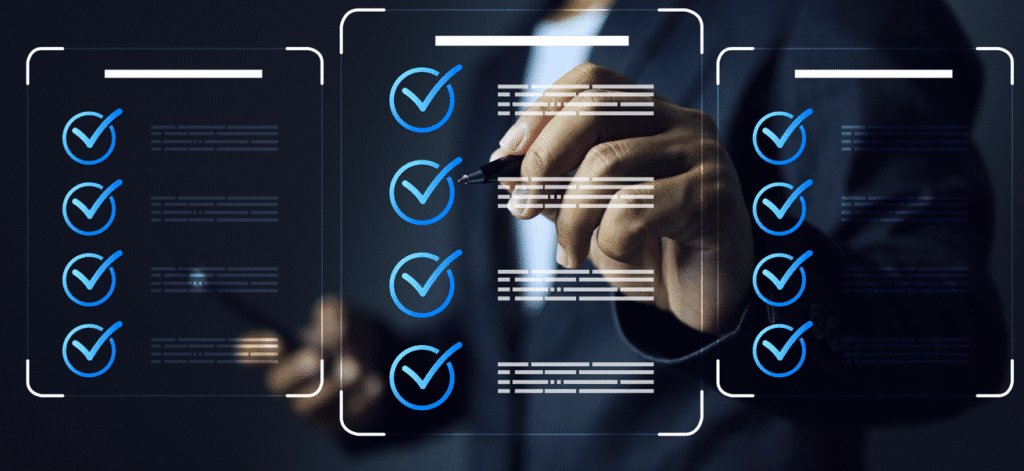Artificial Intelligence (AI) has rapidly shifted from being experimental to essential in many organizations. From improving business communications and automating workflows to enhancing cybersecurity operations, AI now powers decisions across many business functions.
But here’s a question worth asking: If you were asked today whether the vendors you work with are using AI — and how that data is managed — would you know the answer?
For many organizations, the honest response is “not really.” As AI adoption accelerates, third-party risk is becoming a growing blind spot. Vendors are embedding AI into products and services faster than most clients can assess how these tools handle sensitive data, make decisions, or comply with evolving regulations.
As Fairview’s article eloquently states: “Your AI vendor questionnaire is a critical, strategic tool for due diligence. It’s a structured set of questions you send to potential AI providers before you even think about signing a contract.”
If your business uses or integrates any AI-driven tools, it’s time to update your vendor risk management process. Traditional questionnaires that focus solely on security and privacy controls are no longer enough. AI introduces new challenges, data provenance, explainability, accountability, and ethical governance, that require deeper scrutiny.
10 questions to include in your Cybersecurity AI Vendor Questionnaire:
1. What is the purpose and intended use of your AI system?
Clarify the problem the AI is designed to solve and the limitations it faces. Vendors should define the system’s function, decision boundaries, and level of human oversight. Bitsight also points out, it’s advantageous to ask Vendors: “Can I turn off your AI features?” Finding out whether AI is now a mandatory feature in a product and the possibility to opt out is also critical.
Why it matters: Helps identify potential misuse and ensures the tool aligns with your organizational goals.
2. What data is used to train, fine-tune, and operate the AI system?
Ask vendors to describe the origin, type, and sensitivity of data used and whether your data will be incorporated into future model training.
Why it matters: Data transparency prevents privacy violations, IP issues, and hidden bias that could harm customers or reputation.
3. Where is data stored and processed and how is it protected?
Confirm where the data is housed (cloud, on-premises, or hybrid), which jurisdictions it passes through, and the guardrails enforced, such as encryption, access controls, and audit logging.
Why it matters: Data residency and protection directly affect compliance with frameworks like SOC 2, ISO 27001, and GDPR.
4. What cybersecurity controls protect your AI systems and data?
Evaluate the vendor’s overall security posture: incident response, vulnerability testing, endpoint protection, and zero-trust principles.
Why it matters: AI systems expand your attack surface. A vendor’s weak security can make your organization an indirect target.
5. How do you ensure fairness, bias detection, and explainability in your AI models?
Request documentation showing how the vendor tests for and mitigates bias, and whether they provide explainable outputs for users and auditors.
Why it matters: Explainability and fairness are essential for compliance and accountability especially in regulated sectors like finance, healthcare, and government.
6. Who is accountable for AI governance and compliance?
Identify the roles responsible for AI oversight whether an AI Ethics Board, Chief Information Security Officer, or Data Protection Officer.
Why it matters: Governance maturity reflects trustworthiness. Clear accountability ensures issues are managed before they affect your operations or reputation.
7. What is your approach to updates, monitoring, and incident response?
Ask how the vendor handles model drift, algorithmic changes, and cybersecurity incidents, including reporting timelines and corrective measures.
Why it matters: AI models evolve. Continuous monitoring and transparent communication are essential for long-term reliability and compliance.
8. What contractual safeguards and audit rights are in place?
Clarify ownership of data and outputs, liability for errors, audit rights, and what happens to your information upon contract termination.
Why it matters: Contract terms define your leverage. Without them, you risk losing control of sensitive data or intellectual property.
9. How do you manage third-party and sub-vendor risk?
Determine whether the vendor relies on additional providers such as cloud platforms or model developers and how those relationships are monitored.
Why it matters: Your vendor’s vendor can become your weakest link. Understanding the full supply chain reduces hidden exposures.
10. How do you align with emerging AI governance standards and regulations?
Ask about alignment with recognized frameworks, such as ISO/IEC 42001 and the NIST AI Risk Management Framework, as well as regulation such as EU AI Act and Ontario Bill 194.
Why it matters: Vendors that anticipate regulatory shifts demonstrate maturity, readiness, and reduce compliance burdens for your organization.
Quick-Action Checklist
Before you finalize your next AI vendor relationship, make sure you can check off these essentials:
- Confirm AI purpose, use, and limitations
- Verify training data and privacy safeguards
- Ensure compliance with relevant standards (SOC 2, ISO 27001, ISO/IEC 42001)
- Assess cybersecurity maturity and incident response readiness
- Review contractual, audit, and data ownership clauses
Final Thoughts
An effective AI Vendor Questionnaire is more than a compliance formality — it’s a trust framework for the era of intelligent technology. By asking these ten questions, you’ll uncover how responsibly your partners build, secure, and manage their AI technologies.
Organizations that embed AI vendor risk management into their procurement and compliance programs will be best positioned to innovate safely and demonstrate accountability to regulators, clients, and stakeholders.
Resources
Sethupathy, Guru. “AI Vendor Questionnaire : Essential Questions to Ask.” FairNow, 18 July. 2025, fairnow.ai/ai-vendor-questionnaire-questions.
Norremo, Anders. “7 Questions Tech Buyers Should Ask About How Their Vendors Use AI.” Bitsight, 12 Feb. 2025, www.bitsight.com/blog/7-ai-questions-to-ask-your-vendors.
Need more info?
Contact Cyntry to assess your vendor AI governance gaps and strengthen your organization’s readiness for responsible and compliant AI adoption.
Book a no-cost 30-minute compliance and cybersecurity strategy session at Cyntry.com



